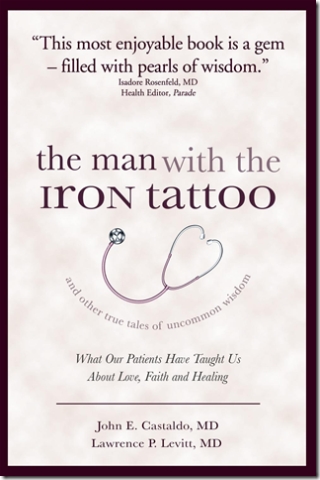I was generously offered an advance copy of 
“The Man with the Iron Tattoo and Other True Tales of Uncommon Wisdom: What Our Patients Have Taught Us About Love, Faith and Healing”
by doctors John E. Castaldo and Lawerence P. Levitt. Additionally, I was given the opportunity to interview one of the authors by telephone (my first phone interview of an author!).
The book (which needs a more abbreviated title) is a series of stories mostly about patient interactions, and what they learned about themselves and their profession and practice from them. The one that wasn’t about a patient was about the suicide of a physician colleague, and its effect on them (it is a model for how docs should look at themselves and each other to see and acknowledge the warning signs of serious depression in people conditioned to ignore their own problems and feelings).
Although I don’t want to spoil the book, there is one chapter in which the child of an author is brain injured in an auto accident, and there is a subtext of what incredible jerks doctors are, even to each other, which is painful to read but very very real.
I enjoyed it, and recommend it for a general audience, but the medical types will enjoy it as well.
For those who don’t want to read the interview, it’s available at Amazon , Independent Publishers Group, and Ben Bella Books.
Dr. Larry Leavitt (Senior Neurologist Emeritus at Lehigh Valley Hospital) took some time from his busy schedule and agreed to be interviewed by me, and here is a poorly-transcribed partial transcript (and any missing conversation or errors are mine):
Dr. L: “Did you read the book?”
GD: lotsa blather to show I actually did read the book. I mentioned that their stories about stroke (both authors are neurologists) got my attention as our center is moving forward to get stroke center certification, which they already have.
Dr. L: “Beware of what you wish for, doing that is going to get you guys busier, and the neurologists here, of which there are 9 find that it’s not easy to suddenly have to be very aggressive and come in at all hours. If it wasn’t for the ER guys, by the way, they couldn’t do it. The ER guys are fabulous here, they get the patients started and are very good at diagnosing.”
GD: What made you decide to write a book?
Dr. L: “We’ve both written in the past, and I wrote a book you may have heard of, “Neurology for the House Officer” with Howard Winer at Harvard which we wrote in the 1970’s trying to make neurology simple. We shared a desk on purpose and realized we were learning about more than neurology, we were learning about life, about people, about how you shouldn’t give up”. (We discuss a chapter having to do with not giving up – buy the book).
“The thrill of this thing has already been achieved for me, the process was great. We recounted what was most important to us that we’d learned over the last 20 years together, about life, not about medicine”.
GD: did you take a writing class?
Dr. L: “I did not; I’ve always liked to write, and writing scientific stuff (I’ve written some papers), so We’ve both written some. And, we had benefit of a marvelous editor Marian Sandmyer (sp) and I love her to death.
Did you listen to the chapter ‘Listen to Eva’? (He discusses the role his wife has had in his lie, and in a medical case as outlined in the book; I paraphrase here).
GD: How did you come to get an agent or a publisher for your book?
Dr. L: “Our neurology book was done by a medical book publisher, and we asked them and they said ‘no, we don’t do that kind of book’; then a friend recommended The Literary Group, who wanted 3 chapters, a proposal, who the audience is, etc. They loved it and sent it our to the big publishers, and they all loved it but said ‘there’s not a big enough audience of medical students out there to buy this book’ to make it profitable. We didn’t think it was for med students and residents, and then the agent sent it to a small publisher, Ben Bella, wanted it and published it”.
GD: Is there a story you wrote that didn’t make the book?
Dr. L: “Yes, we picked 13 stories that we thought were the best, and if this book does well, we’ve got 15 more for a next book”.
GD: What would Dr. Castaldo want to remind me to tell you? What would he say is the message of the book?
Dr. L: “Be humble”, and we talk about a different chapter.
The interview lasted about 25 minutes, and was enjoyable for me, though I couldn’t induce Dr. Levitt to start a blog.



Sounds like another one to add to my ever-growing list! The first thing that caught my attention was “Lehigh Valley Hospital” and then “neurologist.” LVH is not far from me, although I’ve never been there, and neurology……..one of my most favorite things.
Really the book sounds very interesting! Thanks for reviewing it for us! :)